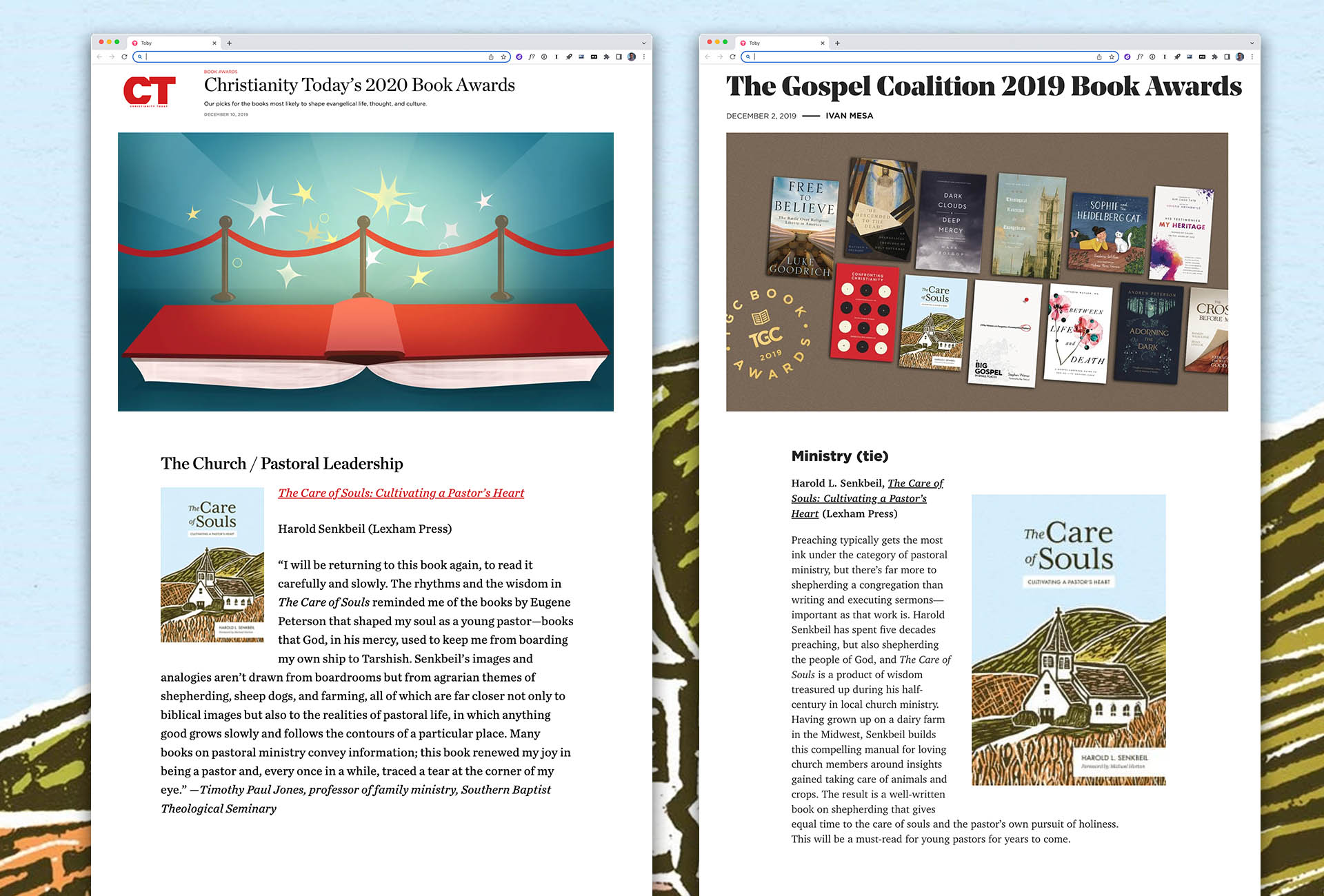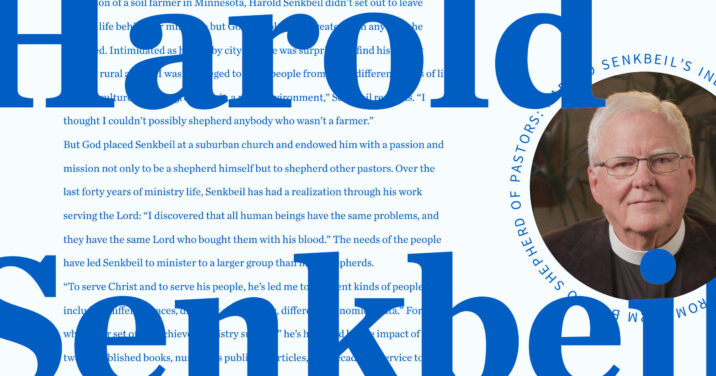As the son of a soil farmer in Minnesota, Harold Senkbeil didn’t set out to leave bucolic life behind for ministry. But God had plans far greater than anything he expected. Intimidated as he was by city folk, he was surprised to find his calling outside rural areas.
“I was privileged to serve people from many different walks of life and subcultures, having grown up in a rural environment,” Senkbeil remarks. “I thought I couldn’t possibly shepherd anybody who wasn’t a farmer.”
But God placed Senkbeil at a suburban church and endowed him with a passion and mission not only to be a shepherd himself, but to shepherd other pastors.
Over the last forty years of ministry life, Senkbeil has had a realization through his work serving the Lord: “I discovered that all human beings have the same problems, and they have the same Lord who bought them with his blood.”
The needs of the people have led Senkbeil to minister to a larger group than most shepherds.
“To serve Christ and to serve his people, he’s led me to different kinds of people, including different races, different subcultures, different economic strata.”
For a guy who never set out to achieve “ministry success,” he’s humbled by the impact of his twelve published books, numerous published articles, and decades of service to the Lutheran Church-Missouri Synod (LCMS).
Senkbeil preaches habitus, the idea that one doesn’t set out to acquire something, but that one gains knowledge by practicing, experiencing, and doing.
A natural instinct for pastoral care
Early in his ministry career, Senkbeil noticed a slight competitiveness between colleagues within the larger community of pastors. A lifelong Lutheran, he opted to lean into caring and found he was truly interested in the ministry lives of his pastor friends:
I made it a point to show appreciation to my colleagues and to show interest in what was going on with them. I would ask, “How are things going?” I’d get their perfunctory replies and then ask again, “No—how are things really going?”
It seems that being a pastor who cares deeply about other pastors was a natural calling for Senkbeil. He was asked to take up formal responsibilities for other pastors within his denomination; then he taught future pastors in the seminary environment.
“I tried to distinguish and yet connect the personal faith aspect of ministry versus the practices of skill in ministry. This doesn’t always come naturally, so I modeled this for students and pastors even as I was teaching them,” says Senkbeil.
He has been caring for pastors for most of his ministry, and he continues to walk beside pastors even after retiring from the pulpit—as director of Doxology, a nonprofit organization for the spiritual care and counsel of Lutheran pastors. Through his work with this ministry, Senkbeil is able to offer soul care together with Christian psychology—a blend of mental health and spiritual health counseling for pastors.
“Unfortunately, there’s a kind of firewall between the reality of what the church is and what the church just looks like. Pastors ask, ‘How am I doing? How am I coming across?’ There’s a cultural pressure to perform,” Senkbeil says. He adds:
Eugene Peterson once noted that a person can impersonate a pastor quite easily by turning on the switch and becoming everybody’s ideal of what a perfect pastor is. But if you know how to do this, well then, you’re in spiritual jeopardy because pretty soon, you are just going through the motions.
It’s this concern together with a lifetime of shepherding that led Senkbeil to write his most highly-praised book, The Care of Souls: Cultivating a Pastor’s Heart (Lexham Press, 2019).
Caring for souls
“The Care of Souls is a summary of my conviction of what a pastor actually is and does,” Senkbeil remarks. “As a pastor’s physician, you listen to their symptoms through the Word of God. You then get them treatment, which is an ongoing process using the Word of God from bringing the gifts of God to people who are in desperate need within their congregations.”
The book must have struck a chord with pastors worldwide because it won Christianity Today’s 2020 top book award and The Gospel Coalition’s ministry book of the year for 2019.

From pastor basics to the role of the Bible as the source of ministry, Senkbeil deftly covers the vastness that is pastoring through his lens of experience as both a pastor and shepherd of other pastors.
In chapter 3, “The Cure of Souls,” Senkbeil says,
Like any competent physician, the pastor doesn’t know what interventions to provide for a distressed soul until he first listens to that soul. He needs an accurate diagnosis, so he begins with the symptoms. But like any good medical doctor, he doesn’t treat the symptoms; he treats the illness.
In today’s quick-fix society, taking a longer approach to caring for people might seem passé, but Senkbeil notes that taking time to listen is perhaps the most important thing pastors can do:
We respond to difficulties, hardships, and calamities differently. Part of being a spiritual physician is helping each individual in their own journey. I’ve found that in any relationship, but especially pastoral relationships, you need to listen a lot to know.
He sees a connection between the modern hectic lifestyle and burdens we bear. “We’re surrounded by noise and we don’t listen. And so, the experience of having someone intently listening to you is a gift; that in itself is a gift to bear,” Senkbeil adds.
He admits that it wasn’t necessarily in his nature to be a good listener, but that his wife taught him how to listen well.
It was during her final convalescence that he penned one of his shortest yet most profound books.
Can Christ and calamity coexist?
Senkbeil spent much of COVID-19 caring for his ailing wife. “There’s no script for grief,” he shares honestly. “With all respect for Kubler-Ross, it’s not necessarily stages. In reality, it’s all mixed up.”
By God’s grace, Senkbeil was able to navigate the treacherous waters of caring for a declining spouse while penning the poignant and moving book, Christ and Calamity: Grace and Gratitude in the Darkest Valley (Lexham Press, 2020).
In it, Senkbeil recaps the COVID-19 pandemic and moves with incredible deftness through doubt, outrage, affliction, weakness, sadness, darkness, aloneness, and death by sharing and speaking honestly as though he is there in person with you listening to all your problems. He does not shuffle off your concerns and replace them with platitudes. Rather, he speaks with a tone as though he’s in the armchair next to you, listening just like he does to the pastors he mentors.
Senkbeil offers a cup of cold water in the form of understanding and simply offers that Christ can stand in for what we lack:
During her days in home hospice, my wife asked me to read to her. So, I read one chapter [of Christ & Calamity] to her every night. We almost had it memorized, and frequently she would say, “Are you sure you didn’t write this for me?”
To which Senkbeil replied, “Maybe I did.”
Part of living a life through the lens of habitus includes recognizing when you’re in new territory and taking each day for what it is. “I’ve never been old before. It’s all an adventure to me. And now I say I’ve never been a widower before. This is life. It’s what our faith is about.”
He adds, “I’ve often said that grief is the other side of love.”
Lexham Ministry Guides
As it turns out, pastors are hungry for pastoral care themselves. Because The Care of Souls touched a nerve with pastors and seemed to provide something they desperately yearned for, Senkbeil, together with Lexham Press, came up with the idea of a series of small books called For the Care of Souls. So far, there’s a hardbound collection of multiple books, with more on the way. Senkbeil has agreed to serve as general editor for this series of Lexham Ministry Guides.
“The big question is, how do we connect with a world that has lost its rudder? You know, we’re trying to be Christians and to be church leaders and pastors in a chaotic environment,” Senkbeil admits. “So how do you address a culture that is increasingly un-Christian and antagonistic?”
The For the Care of Souls series aims to tackle a laundry list of issues for pastors, including the published guides on Pastoral Visitation, Pastoral Leadership, Stewardship, Church Music, and Funerals. Senkbeil explains in the series preface:
The challenges of our turbulent era are driving conscientious evangelists and pastors to return to the soul care tradition to find effective tools for contemporary ministry.
A return to the practices of old—to truly care for the person—is becoming a welcome trend in the lives of many pastors. Senkbeil is paving the way for the revival.
He’s also involved in Lexham’s Fat Cat children’s book series that bring sound doctrine around the Lord’s Prayer and Ten Commandments in the form of children’s literature.
Productivity in the next chapter
Having retired from full-time preaching, the last three years have been some of Senkbeil’s most productive—three books published in three years, along with serving as the general editor for The Care of Souls series, is keeping him quite busy.
A proud grandpa, Senkbeil admits to this time of learning to be a widower as bittersweet: “I get to take care of my granddaughter for a few days before school begins and take my thirteen-year-old grandson to football practice every day. It’s nice I’m able to do this.”
He smiles as he recounts his grandfatherly duties. “And we had a family road trip in June to revisit some old family where we all came from. Next up, we’ll all come together to go to an antique farming show here in Wisconsin for all things rural and agricultural.”
It’s full circle when he can shepherd his own grown kids and grandkids, teaching them about the past and savoring the present.
Despite learning how to grieve the loss of his precious wife, he is grateful for the many good memories. “It’s not horrible, it’s different. I’m pleasantly busy.”
For the pastor who devoted so much of his ministry career to leading other pastors, he’s now able to impart this wisdom through his publishing work—while having quality time with his family, who all live close by.
Senkbeil possesses a sense of calm, resigned satisfaction in the way he speaks about his long career. Without a smidge of pride, he has watched and experienced as God has led him along the path of caring for pastors, parishioners, and family throughout his life.
We could perhaps lean into habitus for ourselves—allowing God to work and move without force or strong-arming the opportunities and results.
At the end of the day, having an impact in the world, at least for Senkbeil, seems to be the natural result of trusting and resting in a life devoted to God.
Related resources
Mobile Ed: LD211 Church Leadership and Strategy: For the Care of Souls (1 hour course)
Regular price: $39.99
Pastoral Leadership: For the Care of Souls (Lexham Ministry Guides)
Regular price: $12.99
Mobile Ed: PC211 The Care of Souls: Cultivating a Pastor’s Heart (5 hour course)
Regular price: $189.99







